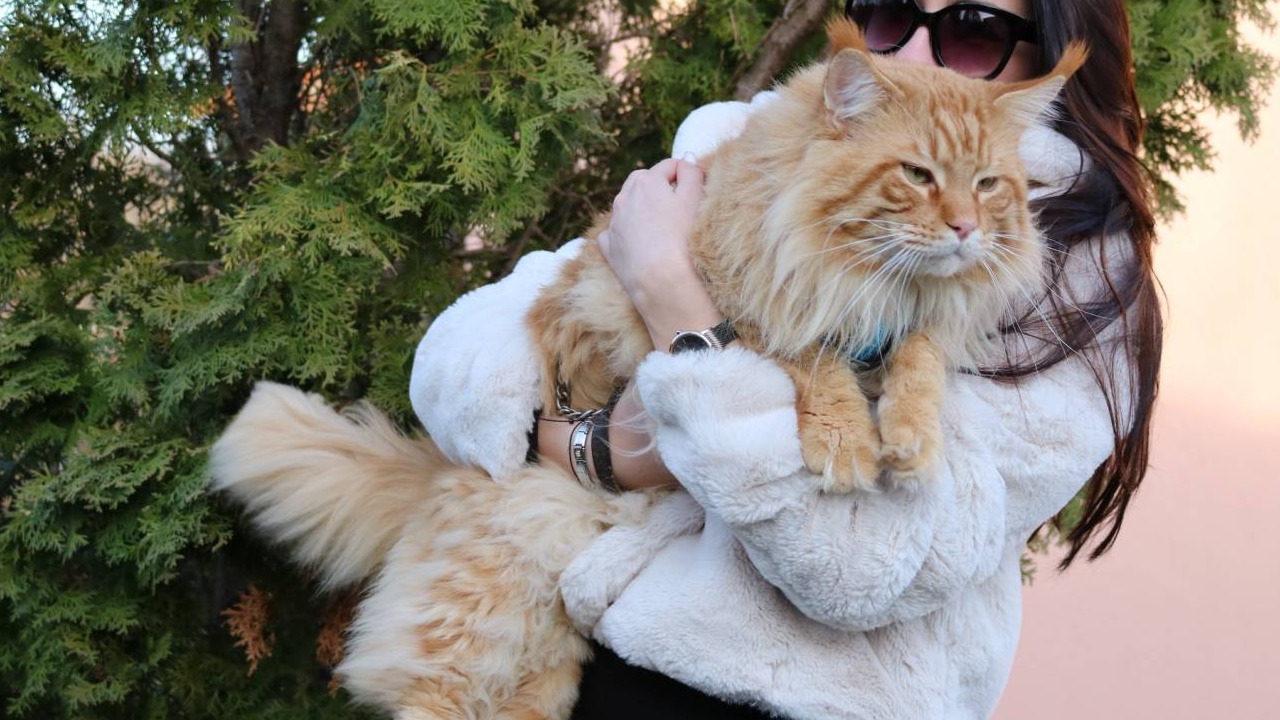+359 894 606 797/+359 899 867 862
mainecoon.lbp@gmail.com
Maine Coon cats are known for their impressive size, making them one of the largest domestic cat breeds in the world. Despite their large bodies, these cats are gentle giants, popular for their affection and playful nature.
Looking for a Maine Coon size chart to compare your kitten's size to others? You may be wondering how big your Maine Coon kitten will get. Here you will find answers to your questions and get a better idea of what to expect from your cat.
Maine Coons are significantly larger than most other cat breeds. Their size varies between male and female cats, with males usually being larger. Here's a breakdown of their average sizes:
Although these are averages, some Maine Coons can grow even larger, with some males reaching 12-13 kg.
Maine coons grow slowly, taking them up to 3-5 years to reach full size. This slower growth rate helps them develop their muscle structure and adapt to their large bodies.
During the first few months, Maine Coon kittens grow rapidly. By 3 months, male kittens usually weigh between 1.8 kg and 2.3 kg, while females weigh between 1.6 kg and 2.3 kg. By 6 months, males can reach a weight between 3.9 kg and 6 kg, and females usually weigh between 3.2 kg and 4.5 kg.
Nutrition: During the first four weeks, the kitten is completely dependent on the mother's milk. It provides him with all the nutrients he needs, including antibodies to build the immune system.
Features: At this stage, the kittens are blind and deaf, they need constant attention from the mother.
Nutrition: Between weeks 4 and 8, kittens usually start to show an interest in solid food. Soft food or wet kibble, especially for kittens, can be introduced while nursing is still being maintained.
Features: Kittens begin to explore their environment, play more and develop their coordination.
Nutrition: Feeding a high-quality kitten food rich in protein and fat is critical for proper growth. At this stage, kittens need food with a high energy value to support their rapid growth and developing musculature. Raw meat can also be introduced into their diet. This is the period when they are completely weaned from mother's milk.
Features: The growth of the Maine Coon is rapid during this period. From the second to the fourth month, the weight of the kittens increases more than 3 times.
Nutrition: Continue feeding with kitten food, and it is good that the diet consists of a variety of food - granules, wet food and raw meat. At this stage, kittens begin to eat larger amounts of food, which is necessary to support their rapid growth.
Features: The Maine Coon kitten is starting to show its first signs of being a mature cat, building its musculature and character.
During this period, Maine Coons continue to grow steadily, but at a slower pace. By 12 months of age, males typically weigh between 5.7 kg and 8.7 kg, while females reach between 4.5 kg and 6.5 kg. At this stage, Maine Coons are still developing their musculature and final physical structure.
Maine Coons can continue to grow into their 3rd or 5th year. During this period, their weight stabilizes, and they develop their full potential. Adult males usually weigh between 6 kg and 11 kg, while females stay in the range of 4.5 kg to 7.5 kg.
| Age | Male Maine Coon weight (grams) | Weight of female Maine Coon (gram) |
| Newborn kitten | 110-155 | 105-135 |
| 1 week | 175-270 | 170-240 |
| 1 month | 630-750 | 550-680 |
| 2 months | 1230-1600 | 1100-1400 |
| 3 months | 1800-2300 | 1600-2300 |
| 4 months | 3000-4000 | 2400-3600 |
| 5 months | 3200-5500 | 2900-4000 |
| 6 months | 3900-6000 | 3200-4500 |
| 7 months | 4200-6500 | 3500-4600 |
| 8 months | 4500-7000 | 3800-5000 |
| 9 months | 5000-7300 | 4000-5200 |
| 10 months | 5200-8000 | 4000-5500 |
| 11 months | 5700-8000 | 4300-6000 |
| 12 months (1 year) | 5700-8700 | 4500-6500 |
| 18 months (1.5 years) | 6000-10000 | 4500-7000 |
| 3 years and over | 6000-11000 | 4500-7500 |
Several factors determine how big your Maine Coon will grow:
Maine Coon size is largely determined by genetics. Cats from larger parents are likely to grow larger. When getting a Maine Coon, it's a good idea to ask the breeder about the size of the kitten's parents if you want to get a rough idea of how big your pet can grow.
A Maine Coon kitten's weight is an important indicator of its health and development, as well as its potential size in the future, but it should not be the main factor in choosing a pet. It's important to monitor the kitten's weight properly and make sure it comes from a responsible breeder who cares about its health.
However, when choosing a kitten, you should remember that you are getting a new family member, not fruits and vegetables by the pound. The health and well-being of the kitten, as well as your personal relationship with the animal, play a key role in the decision.
A well-balanced diet is essential for Maine Coon growth. During the first year, kittens need high-quality food rich in protein, fat and essential nutrients to support their rapid growth. Proper nutrition throughout their lives helps maintain a healthy weight and muscle development.
Spaying or neutering a Maine Coon before they reach sexual maturity (around 6 months) can have a slight effect on their growth. Neutering cats before puberty is beneficial for their health and behaviour, reducing the risk of diseases such as genital cancer, preventing unwanted pregnancies and leading to a calmer demeanor. After castration, the hormonal balance changes, which slows the metabolism and increases the appetite, often leading to weight gain if the diet is not adjusted to the individual needs of the cat.
Maine Coons are active and playful cats that need space to move around. Physical activity not only helps maintain muscle structure, but also prevents the accumulation of extra pounds. Providing a stimulating environment with sufficient opportunities for exercise is key to maintaining their health.
The large size of Maine Coon cats is the result of a combination of genetic factors and historical adaptations. The origins of the breed can be traced back to America, where these cats developed in the harsh climate of the state of Maine. Their large body and long, thick fur are evolutionary adaptations that help them cope with extreme winters and hunt effectively in the cold environment.
In addition, the selection work of breeders in recent decades has also contributed to the preservation and even increase of the size of the breed. Maine Coons are bred to preserve their characteristics, which makes them particularly popular among cat lovers around the world.
Maintaining a healthy weight is critical to Maine Coon cats' longevity and quality of life. To achieve this, it is important to provide a balanced diet that covers their energy needs without causing excess weight gain. High-quality foods rich in protein and moderate in fat are ideal for maintaining muscle mass and energy balance.
Physical activity also plays an important role. Maine Coons are active cats that love to play and explore. Providing enough space and stimulation to play will help keep them fit.
Maine Coon cats are extremely impressive with their size, which makes them one of the largest and most imposing pets. Understanding their growth, the factors that influence it and the specific care they require is key to ensuring a long and healthy life.
With proper care and attention, these gentle giants will delight you with their devotion and unique character.

Luxury Bellus Pride Maine Coon - all rights reserved.
Design and development Rebecca Todorova.
